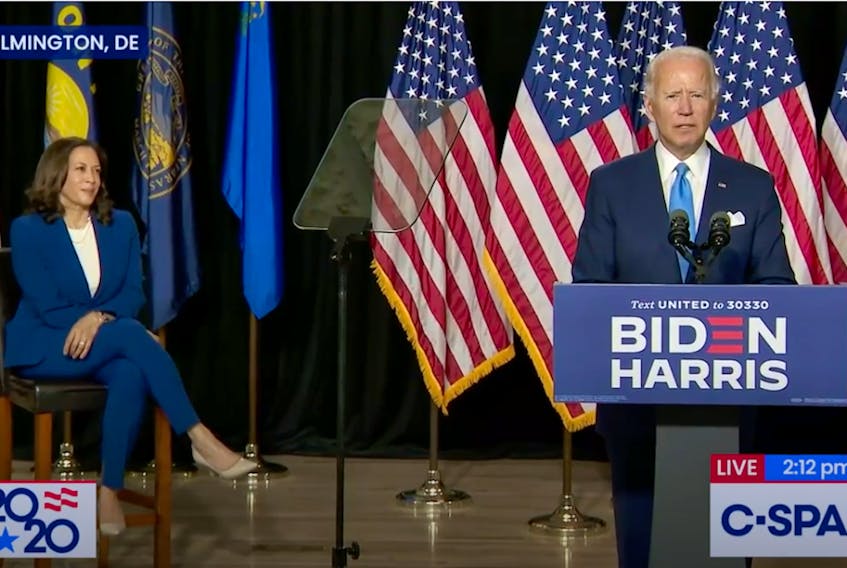Peter McKenna
Guest opinion
Quick question: How do you conduct a U.S. presidential election campaign in the middle of a deadly pandemic? And, secondly, will the two campaigns be radically different from past electoral strategies and formats?
In the COVID-19 era, it was hard not to notice at the launch of the Biden-Harris ticket (and the no in-person and scaled-down party nominating convention) the new rules of the political game: no wild and boisterous supporters and party operatives, an absence of balloons and confetti and not much in the way of political excitement and atmospherics. It certainly made for odd television viewing.
Add to that a series of atypical interpersonal measures — namely, no hugs or high-fives between Biden and Harris, periodic social distancing and, of course, visible mask-wearing. This is most assuredly not like any other U.S. presidential campaign that I’m accustomed to. There was not even any loud hooting or clapping in a jam-packed and sweaty arena.
Those types of political visuals used to dominate previous election coverage in the U.S. Now the journalistic scribes keep six feet apart and have to shout their questions from mostly the sitting position. Indeed, it looks as if the patented media “scrum” has gone the way of the dodo bird.
Remember when election events were marked by often chaotic press availabilities in the morning, mass rallies in the evening and infrequent, though nerve-wracking, presidential debates before a live audience. No longer, I’m afraid.
What about the critically important “get-out-the-vote” party initiatives in light of the highly-infectious coronavirus? It’s hard to imagine young and enthusiastic volunteers knocking on peoples’ doors and looking for their support — all while physically distancing themselves. Can you even handout campaign literature to voters and still respect public health protocols?
It’s even uncertain whether Joe Biden and Kamala Harris will be campaigning together in the same venue. Biden has said that he would like to, but will defer to whatever the science and public health guidance will allow.
Moreover, it’s not looking great for in-person voting either — especially for those fearful in vulnerable communities. There will be some no doubt. But it is looking more and more like an election based on unprecedented universal mail-in balloting.
Do all of these changes presage an extraordinary dull U.S. presidential election cycle? Will this period be remembered as the life-altering “pandemic election,” the “virtual campaign” on steroids or the most forgettable election in modern U.S. history?
To be honest, I’m not exactly sure how this presidential campaign is going to unfold in terms of tactics, strategy and visuals. From a political communications standpoint, it looks certain to be an election fought heavily via social media platforms and relentless online efforts to gin up their respective political party bases.
But it’s also possible that TV attack ads and the flooding of the airwaves with negative political messaging could reach unprecedented levels (and spending) this time around. This political advertising, if done well in terms of production quality, could play a huge role in determining the final outcome on Nov. 3 (or days later).
Virtual events are sure to become the go-to replacement for large political pep rallies. Accordingly, there is likely to be a huge increase in Zoom interviews with cable networks, one-on-one sessions with high-profile media types and more intimate, though “distant,” gatherings with party donors and grandees.
How will U.S. President Donald Trump manage? He can’t just keep doing his almost daily coronavirus briefings from the White House during the campaign?
Interestingly, an argument could be made that such a virtual campaign could help Biden and actually hurt President Trump. As the front-runner, and notoriously gaffe-prone politico, Biden would likely benefit from waging a more low-key, low-tempo and low-stress type of political campaign. It would seem to offer him and his campaign team a means of camouflaging Biden’s obvious diminution of mental acuity.
For Trump, though, he relishes the big stage, the big production and the big audience. In 2016, he used to get rejuvenated each evening from his raucous election rallies of supporters wearing MAGA T-shirts and hats.
To be sure, he often liked to go off-script, walk the stage clapping his hands and reeling off a laundry-list of crowd-pleasing one-liners. It’s true that “teleprompter Trump” in a virtual setting just won’t cut it for his backers this time around. And right now, with his poll numbers under water, Trump needs every vote that he can muster.
There’s no disputing the fact, then, that 2020 is going to be one strange U.S. presidential campaign. The real question going forward, however, is whether this is a one-off or a sign of the future.
Peter McKenna is professor of political science at the University of Prince Edward Island.









